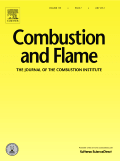
Combustion and Flame
Scope & Guideline
Pioneering Research in Energy Engineering
Introduction
Aims and Scopes
- Combustion Chemistry:
The journal publishes extensive research on the chemical kinetics of combustion reactions, including detailed mechanisms of fuel oxidation, intermediate formation, and pollutant generation. - Experimental Techniques:
Research articles often incorporate advanced experimental techniques such as laser diagnostics, shock tubes, and high-speed imaging to investigate combustion phenomena. - Numerical Modeling and Simulations:
A significant emphasis is placed on computational fluid dynamics (CFD), large eddy simulations (LES), and reduced-order models to predict combustion behavior under various conditions. - Soot and Emissions:
The journal addresses the formation, properties, and reduction strategies for soot and other emissions in combustion systems, highlighting the environmental impact of combustion processes. - Alternative Fuels and Combustion Systems:
Research on alternative fuels, including hydrogen, ammonia, and biofuels, is a core focus, exploring their combustion characteristics and potential for cleaner energy applications. - Thermoacoustic Instabilities:
The investigation of thermoacoustic phenomena and their implications on combustion stability and efficiency is a recurring theme in the journal.
Trending and Emerging
- Hydrogen and Ammonia Combustion:
With the push for cleaner energy, research on hydrogen and ammonia as alternative fuels has surged, focusing on their combustion characteristics, emissions, and potential for integration into existing systems. - Plasma-Assisted Combustion:
The application of plasma technology in enhancing combustion processes is gaining traction, with studies investigating its effects on ignition, stability, and emissions. - Machine Learning and AI in Combustion Modeling:
The integration of machine learning techniques for optimizing combustion models and predicting reaction kinetics is an emerging trend that reflects the increasing role of data-driven approaches in combustion research. - Advanced Fuel Blends:
Research on blends of conventional and alternative fuels, especially those involving biofuels and synthetic fuels, is becoming more prevalent, focusing on their combustion performance and emissions. - Thermal Management and Flame Control Techniques:
Innovative techniques for managing combustion dynamics, such as flame control through external influences (e.g., magnetic fields or acoustic waves), are being explored more frequently. - Soot Characterization and Mitigation Strategies:
As environmental concerns grow, there is a rising focus on understanding soot formation mechanisms and developing effective strategies for soot reduction in combustion systems.
Declining or Waning
- Traditional Hydrocarbon Fuels:
There has been a noticeable decrease in research focused solely on traditional hydrocarbon fuels as the scientific community increasingly shifts towards alternative and renewable energy sources. - Static Combustion Models:
Static models that do not incorporate dynamic effects or real-time data analysis are less frequently published, as the field moves towards more adaptive and real-time modeling approaches. - Low-Temperature Combustion of Conventional Fuels:
Research on low-temperature combustion mechanisms of conventional fuels has seen reduced attention, likely due to the growing interest in high-temperature and advanced combustion strategies. - Simple Reaction Mechanisms:
There is a decline in studies employing overly simplified reaction mechanisms, as the trend is towards more detailed and complex models that capture the intricacies of combustion chemistry.
Similar Journals

JOURNAL OF ENGINEERING PHYSICS AND THERMOPHYSICS
Advancing the Frontiers of Engineering Physics and ThermophysicsJOURNAL OF ENGINEERING PHYSICS AND THERMOPHYSICS, published by Springer, is a vital resource for researchers and professionals in the fields of engineering physics and thermophysics. With an ISSN of 1062-0125 and an E-ISSN of 1573-871X, this esteemed journal has been disseminating high-quality research since its inception, covering critical advancements in both condensed matter physics and various engineering disciplines. Despite its classification within the third quartile in both Scopus categories for 2023, the journal remains a significant conduit for innovative studies that push the boundaries of knowledge in thermal and physical engineering, with converged years spanning from 1992 to 1997 and 2004 to 2024. The journal does not offer open access, which means subscribers and institutions have exclusive access to its rich content. As the field continues to evolve, JOURNAL OF ENGINEERING PHYSICS AND THERMOPHYSICS plays an essential role in fostering scholarly discussions and supporting the academic community in tackling contemporary engineering challenges.
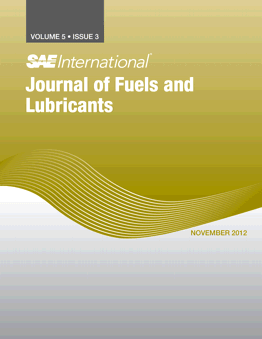
SAE International Journal of Fuels and Lubricants
Connecting Academia with Industry for Impactful ChangeWelcome to the SAE International Journal of Fuels and Lubricants, a leading peer-reviewed publication dedicated to advancing knowledge in the crucial fields of fuel technology and lubrication science. Published by SAE International, this journal serves as a vital resource for researchers, industry professionals, and students engaged in the study and application of innovative fuels and lubricants. With an impact factor indicative of its importance, the journal is ranked in the Q3 category for both Fuel Technology and Pollution, highlighting its critical role in addressing global energy and environmental challenges. Covering a range of topics from fundamental research to practical applications, the journal not only contributes to academic discourse but also serves to inform industry practices. Our publication spans the converged years from 2009 to 2024, reflecting a commitment to continuous scholarly contribution. While currently operating under a traditional access model, the journal aims to foster an inclusive environment for discourse in the rapidly evolving fields of energy and environmental science.

Applications in Energy and Combustion Science
Igniting Innovation in Energy and Combustion ResearchWelcome to Applications in Energy and Combustion Science, a premier open-access journal published by ELSEVIER that has been at the forefront of research since 2020. With the ISSN 2666-352X, this journal is dedicated to advancing the knowledge and application of energy technologies and combustion systems, reflecting a strong commitment to the evolving demands of the field. Based in the United Kingdom and recognized for its robust contributions, it has achieved noteworthy status in the 2023 rankings: a Q1 classification in both Chemical Engineering (miscellaneous) and Fuel Technology, alongside a Q2 standing in Energy (miscellaneous). Researchers will find it a significant platform, with Scopus rankings placing it among the top tiers in various categories. This journal offers an essential resource for professionals and students aiming to stay abreast of innovative developments and applications in the critical areas of energy and combustion, ensuring broad accessibility and dissemination of research findings.
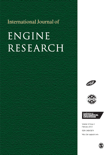
International Journal of Engine Research
Advancing Innovation in Engine ResearchWelcome to the International Journal of Engine Research, an esteemed publication dedicated to advancing the fields of Aerospace Engineering, Automotive Engineering, Mechanical Engineering, and Ocean Engineering. Published by SAGE Publications Ltd and based in the United Kingdom, this journal has earned a prestigious reputation, consistently ranking in the Q1 quartile in several engineering categories as of 2023. The journal's impact is evident through its high Scopus rankings, positioning it within the top 25% of global research in Aerospace and Automotive engineering, and within the top 20% for Mechanical engineering. With a commitment to publishing rigorous, peer-reviewed research from 2000 to 2024, the International Journal of Engine Research plays a vital role in fostering innovation and collaboration within the engineering community. Although this journal does not offer open access, it remains a critical resource for researchers, industry professionals, and students striving to deepen their understanding in these dynamic fields.
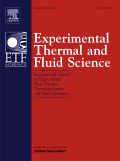
EXPERIMENTAL THERMAL AND FLUID SCIENCE
Elevating thermal and fluid science with impactful research.EXPERIMENTAL THERMAL AND FLUID SCIENCE is a prestigious academic journal published by Elsevier Science Inc, dedicated to advancing the fields of thermal and fluid sciences. With a strong focus on innovative experimental research, it plays a crucial role in disseminating new knowledge and techniques across multiple domains, including Aerospace Engineering, Chemical Engineering, Fluid Flow and Transfer Processes, Mechanical Engineering, and Nuclear Engineering. Holding a notable impact factor and ranking in the Q1 quartile across these categories since 2023, the journal is recognized for its high-quality contributions, which appeal to a diverse audience of researchers, industry professionals, and students alike. Additionally, with dedicated coverage from its inception in 1988 to projections extending through 2025, EXPERIMENTAL THERMAL AND FLUID SCIENCE provides a vital platform for sharing advancements in experimental techniques and findings that shape the future of engineering and applied sciences.

ATOMIZATION AND SPRAYS
Connecting Researchers in Fluid Mechanics and BeyondATOMIZATION AND SPRAYS, published by BEGELL HOUSE INC, stands at the forefront of research in the dynamic field of chemical engineering, particularly focusing on the intricate processes of atomization and the mechanics of droplet dynamics. Established in 1996, this prestigious journal aims to disseminate innovative findings and methodologies that drive advancements in applications ranging from spray technologies in industrial processes to environmental technology and energy conversion systems. With a current Impact Factor that reflects its significance within the community—ranked in the Q3 quartile—it serves as a comprehensive resource for researchers, professionals, and students eager to deepen their understanding of fluid mechanics and spray applications. Though not an open-access publication, it provides critical insights and a platform for scholarly communication and exchange in its converged years, fostering collaboration and innovation within the domain.
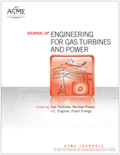
JOURNAL OF ENGINEERING FOR GAS TURBINES AND POWER-TRANSACTIONS OF THE ASME
Fueling Ideas for Sustainable Power SolutionsJournal of Engineering for Gas Turbines and Power - Transactions of the ASME, published by the esteemed American Society of Mechanical Engineers (ASME), is a leading interdisciplinary journal dedicated to advancing the fields of energy engineering, aerospace, nuclear energy, and mechanical engineering. With an impressive history dating back to 1960 and continuing its contributions through 2024, this journal boasts a Q2 ranking in multiple engineering categories, reflecting its strong impact on both academia and industry. Although not an open-access journal, it provides invaluable insights and research findings that cater to the needs of professionals, researchers, and students alike. The journal's ISSN is 0742-4795 with an E-ISSN of 1528-8919, ensuring widespread visibility in the global academic community. Indexed in Scopus, it ranks notably within its fields—21st in Nuclear Energy and Engineering and 51st in Aerospace Engineering—underscoring its relevance and contribution to critical technological advancements. Researchers in this domain will find the journal a vital resource for innovative studies, practical applications, and the latest developments related to gas turbines and power generation.

Fuels
Advancing Knowledge in Fuel Science and TechnologyFuels is a premier open-access journal published by MDPI, focusing on the multifaceted field of fuel science, technology, and applications. Since its inception in 2020, this journal (E-ISSN: 2673-3994) has rapidly become a vital resource for researchers, professionals, and students engaged in the exploration of sustainable fuel alternatives, combustion technologies, and energy conversion processes. Located in Basel, Switzerland, Fuels aims to disseminate high-quality research that not only advances academic understanding but also addresses real-world energy challenges. By embracing an open-access format, it ensures that significant findings are readily available to the global scientific community, helping to foster collaboration and innovation in the transition to cleaner energy solutions. With an emphasis on interdisciplinary research and practical applications, Fuels is poised to be a leading journal that shapes the future of energy technologies.

DOKLADY PHYSICS
Exploring the Depths of Computational Mechanics.DOKLADY PHYSICS is a prominent academic journal dedicated to advancing knowledge in the fields of computational mechanics, mechanics of materials, and general physics and astronomy. Published by MAIK NAUKA/INTERPERIODICA/SPRINGER, this journal has established itself as a crucial resource for researchers and professionals keen on exploring the intricacies of physical phenomena and engineering applications. With its ISSN 1028-3358 and E-ISSN 1562-6903, DOKLADY PHYSICS has been contributing to scientific discourse since its inception in 1996 and continues to provide a platform for innovative research up to 2023. Despite its current Q3 ranking in several key categories, the journal maintains an inclusive approach, striving to influence both academic and practical aspects of its fields. While the journal may not be open access, it remains a vital publication for those interested in high-quality research, as reflected in its Scopus ranking positions across various engineering and physics categories.
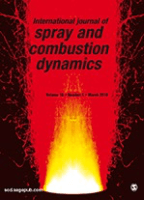
International Journal of Spray and Combustion Dynamics
Bridging Theory and Application in Combustion ScienceWelcome to the International Journal of Spray and Combustion Dynamics, a premier publication dedicated to advancing the understanding of spray and combustion phenomena in various applications. Published by SAGE Publications Inc, this journal serves as a vital resource for researchers and professionals in the fields of Automotive Engineering, Energy Engineering, and Physics, boasting a commendable Q2 ranking in its categories for 2023. With an ISSN of 1756-8277 and E-ISSN 1756-8285, it engages a global audience in the investigation of innovative solutions to energy efficiency and combustion processes. Operating from the United Kingdom, this journal is a key player in disseminating high-quality research findings from 2011 to 2024, making it a go-to source for those seeking to enhance their knowledge and contribute to cutting-edge developments in these dynamic areas of study. Researchers, practitioners, and students alike will find this journal invaluable for staying informed and connected to the latest advancements in spray and combustion dynamics.